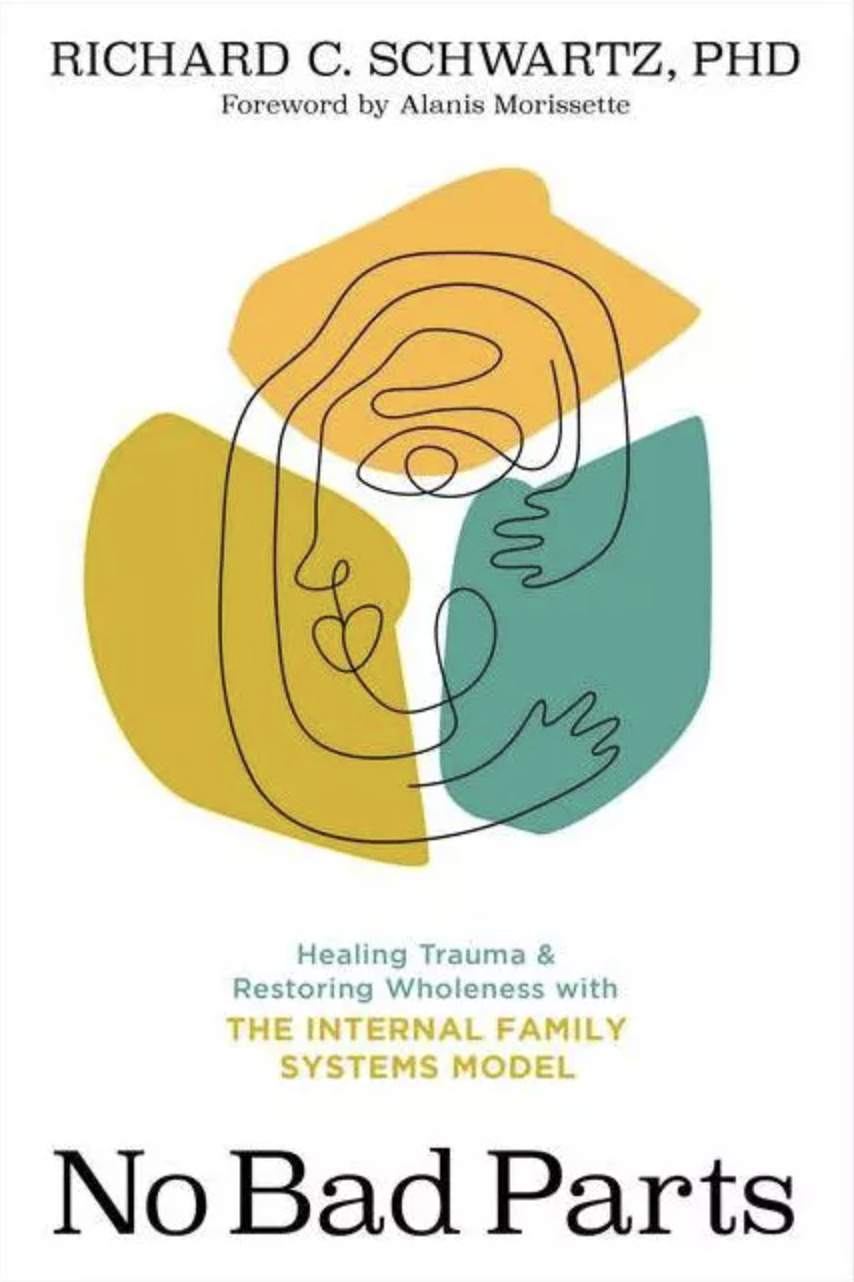foreword to “no bad parts" a book by richard schwartz
I remember the moment I was formally introduced to Dick Schwartz’s Internal Family Systems (IFS) work. I had flown to Asheville, North Carolina, in the midst of a second bout of postpartum depression to address the many underpinnings of my overwork, over-giving, and chronic overextension. This lifestyle has become increasingly normalized and celebrated even as it continues to wreak havoc on our physical, emotional, and relational lives. I was there for several days with Bryan Robinson, a seminal voice in work addiction recovery. I was deeply committed to looking at the elements of my internal world that kept me frozen yet frantic on life’s increasingly quickening treadmill. I distinctly remember looking at Bryan at one point in the middle of a deep inquiry and asking him, “What is this, Bryan?” “This is Internal Family Systems,” he said. I smiled at how graceful and deeply kind and all-embracing this work was. And how much more easily I could find my seat of awareness as I dialogued with many different parts within, some of whom have been yearning for attention for a very long time. It was in doing IFS work that I found an anchor, a place of warm neutrality and curious witnessing, a self-compassion that had been nearly impossible to will myself into offering to my own psyche.
I have been a “parts girl” since as far back as I can remember. I have always been obsessed with our complex, fragile, multitudinous, and fascinating human condition. When I started to work with IFS, I was buoyed by the idea of returning to our birthright of wholeness through offering attention and care to each “part” of myself as it adorably, horrifyingly, ceaselessly, and sometimes painfully presented itself. It was encouraging that my angry part and my mother part and my artist part and my financially responsible (or irresponsible!) part and my free-spirit part could somehow bring wisdom to me if I but opened my heart and my curiosity to them. Each part—as scary or illuminating or mysterious as it may appear to be—could offer wisdom and solace and vision. I came to see these internal parts as messengers. Dialoguing with them could offer helpful guidance and insight. The whole system of my many “selves” could thereby integrate into my everyday personality and life. These parts could even dialogue with and among each other, facilitated by my highest Self. In doing so, there would emerge clarity, ideas, or answers to seemingly insurmountable, complicated questions about my life. These answers would come fast and furious as I communicated through words, writing, movement, and art with the many parts within, even and especially the parts that scared me the most.
In my internal world, I encountered my own murderous rage, my shame, terrors, depression, aches and yearnings, humiliations, and grief. In addition to these “dark” or “bad” parts that seemed to want to doom me to repeated patterns and painful habits, there were equally “light” or “good” parts that also required my courage to open to the visionary parts; the generous parts; the intelligent parts; the leadership parts; the gifted, sensitive, empathic parts. Some parts seemed easier to dialogue with than others. Some felt riskier and downright threatening to embrace. The deeper I went into Dick’s IFS work, the more his words and teaching rang liberatingly true. That each part, however harrowing its acting-out, however hidden, confusing, or painful, had the best of intentions and held helpful messages for me. Without fail, each part, whether an exile, manager, or protector, had profoundly kind and wise insights for me from my highest Self, if I but took the time to be there with them.
In the process of becoming more and more familiar with IFS, a rich sense of spirituality emerged. It was the soulful reward for allowing this curiosity to ever so slowly open up my bound heart. I saw that this Self that dialogues with all the egoic parts is my/the soul. Dwelling in this awareness allowed me to have a direct, physically felt sense of god/love/spirit/compassion. I came to see that the true dialogue began when I found this “seat” of Self. I would recognize it when I would begin to feel the agendaless-ness of the IFS “eight Cs”: creativity, courage, curiosity, a sense of connection, compassion, clarity, calm, confidence. What had felt daunting to me my whole life—going within to take responsibility for or inquire about my urges, compulsions, triggers, and reactions—slowly became somewhat exciting. Dick Schwartz took all the Jungian and shadow work I have done to a whole other level of healing.
I am very grateful that Dick has continued to spread the word of IFS around the world. Watching him do IFS work with people is a heartwarming and deeply connective sight to behold. I believe we need IFS now more than ever before. His work offers each of us nothing less than the cultivation of kindness, wisdom, and empowerment if we’re willing to look within. Doing this work allows every single part of us a moment in the sun. In giving our attention to the parts that need it most, true healing happens. As the compassion grows within us for our very selves, slowly but assuredly it affects the world at large, supporting our efforts to grow and shift toward a world of less divisiveness, strife, and needless suffering. We see that our delicate and brilliant humanity is shared among us all.
Alanis Morissette
San francisco, march 2021

